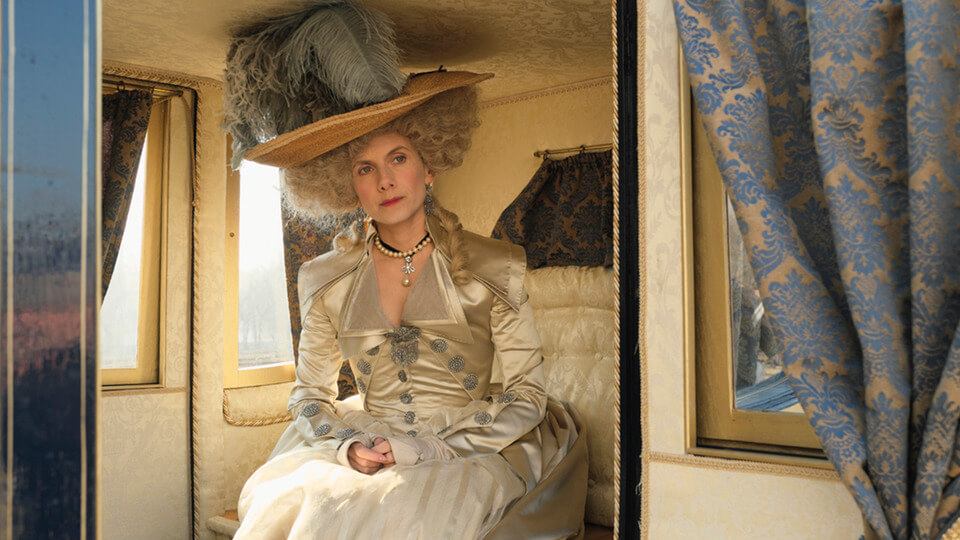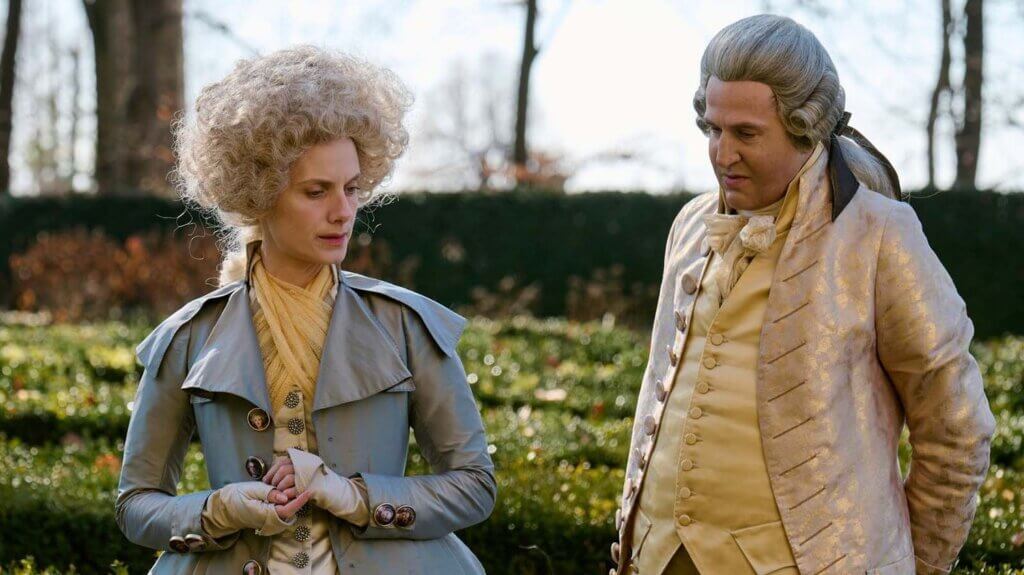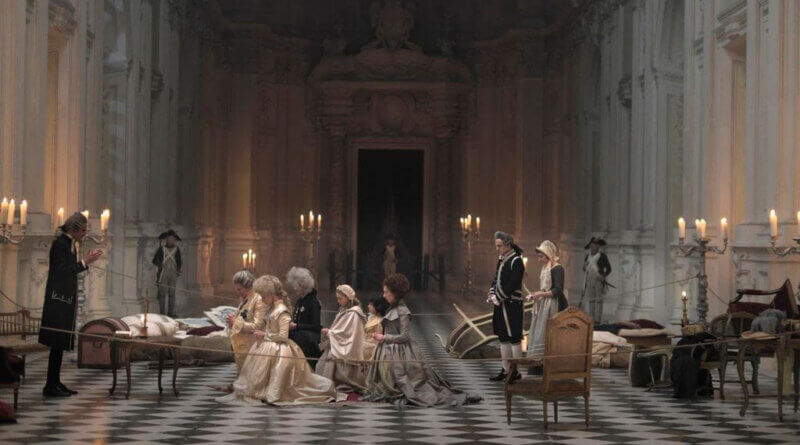The Flood (2024), A Misogynistic Rewriting of French History
I like historical films to be as accurate to their respective times as possible. That said, I’m not a purist. Artists should have room to be modernize, adapt, and insert their own creativity into the story. Sofia Coppola’s Marie Antoinette (2006) is a perfect example. It features modern music and amplified colors and styles, yet it largely keeps the historical aspects of the French Queen’s life intact. The same cannot be said for Gianluca Jodice’s The Flood (2024), or Le Déluge in French, a film that prioritizes misogyny and debunked historical farce to depict King Louis XVI and Queen Marie Antoinette in their final days at the Tour du Temple.
The fact that Marie Antoinette still remains a “polarizing” figure is, in my mind, a travesty, and the result of centuries of misinformation. To justify and downplay the uglier sides of the French Revolution (and the subsequent revolutions in France), Marie Antoinette has persistently been depicted as a hypersexual, devious, greedy, and unsympathetic fool. While she was most certainly “out of touch” in many respects, she was actually quite dutiful to the people of France. One need only read authentic biographies, like Marie Antoinette: The Journey by Antonia Fraser, to get a much more historically accurate depiction of the ill-fated Queen.
But I digress. I’m here to discuss Le Déluge, a French-Italian coproduction, spearheaded by an Italian director and two Italian screenwriters. Much to my surprise, the film was shot entirely in Italy. I’ve generally found that the French do their own history the most disservice on the silver screen, but it appears that Italians are just as capable of bungling French history as anyone else.
The film is split into three somewhat distinct acts: The Gods, The Men, and The Corpses. In the first act, we see King Louis XVI arrive at the Tour du Temple to await his trial with his wife, the Queen, their two children, and a small number of servants. They still uphold their “Divine” appearance, even in the face of hateful revolutionaries.
They accustom themselves to the less than ideal circumstances, though Marie Antoinette acts disgusted, and harbors palpable anger for her husband. In reality, she was very comforting to her family in their final days, and she kept her composure and even showed kindness to her captors. But, once again, the script wreaks of misogyny and misinformation, painting King Louis as the feckless (this was somewhat true) protagonist, awaiting his fate with dignity, while Marie Antoinette sulks and screams and throws her rage at her husband.

As the film descends into Act 2, the living conditions of the King and his family worsen, as does Marie Antoinette’s mood. While occasionally showing affection for the King, she mocks him, laments that she won’t be able to touch Count Fersen again (an affair that may or may not have even happened), and shows nothing but malice for the revolutionaries. Her character is so bitterly portrayed that she comes across as the villain.
The Queen only becomes sympathetic to viewers in a completely fabricated scene in which a guard rapes her, though she relunctantly obliges to the sex in return for better treatment for her and her family. This scene also feeds into the false narrative that Marie Antoinette was an extremely lustful woman, as she seems to take a certain degree of pleasure in giving herself to the guard. This could not be further from the truth, but the filmmakers really wanted to push the “Austrian Whore” propaganda.
By the third act, the family has been completely broken by the living conditions and the impending threat of death. They cling to little bits of hope, but once the king is sentenced to death, all hope is lost. When the king is granted a final, semi-private meeting with his family, Marie Antoinette screams out in agony, and then screams at the revolutionary onlookers. This was not recorded in any letter or historical text, and it contradicts what we know of the real Marie Antoinette, who showed self-control and a dutiful nature at all times.
Since we live in a era where kings and queens are seen as a relic of the past (and potentially a dangerous foreshadowing of the near future), the film struggles to balance its message. On the one hand, it wants to make the family’s plight a sympathetic one, but on the other hand, it paints King Louis and Marie Antoinette as oblivious to the lives and needs of the French people. This would have been more believable in the earlier years of their reign — when they were just teenagers. Later, once things had already spun out of their control, the King and Queen were far more aware of the people’s suffering, but the film has no time for this kind of nuance.

The dialogue is written to support the values of the Republic and denegrate the Ancien Regime, but it does so with all the subtlety of a bull in a china shop. The viewer is beaten over the head with “Monarchy bad, freedom good.” The politics and philosophical conversations never progress further than that. Of course, much of the dialogue is more practical in nature, addressing the daily difficulties of a family accustomed to opulence, thrust into imprisonment and poor living conditions. However, scenes in which the King debates politics and the Queen asks if someone could teach her how to cook are completely laughable.
There are some beautiful costumes of the era, and the film benefits from some stunning shots inside and outside the palace (one that is meant to represent the Tuileries). However, the visuals are one of the few areas where the film excels. Writing, characterization, and historical accuracy are all sacrificed so that the filmmakers can make a politicized point about the evils of monarchy. There are also a few shots that use CGI and cheap-looking props that take away from otherwise breathtaking cinematography.
Do I think that King Louis XVI and Marie Antoinette were treated fairly, retrospectively? No. Do I think there should be kings and queens who rule like despots? Also no. But do I think historical women should be misrepresented to make the latter point? Definitely not. I would almost go as far as to say that the 1938 American film about Marie Antoinette provided a more accurate characterization of the last queen of France, and that’s saying quite a lot.
The bad (or good, perhaps?) news is that the film is extremely difficult to find. It’s not available on any streaming platforms at the moment, so you’ll either need to purchase a physical copy somewhere or catch it at your local independent theater. Either way, I hope that people don’t walk away from this film thinking it’s an accurate portrayal of Marie Antionette, her relationship with King Louis XVI, or their final days in the Tour du Temple. It’s simply a beautiful looking film with a hatred of women, monarchies, and believable dialogue.
The Flood (2024) Movie Rating: ★★ out of 5
If you’d like to watch The Flood (2024), the film is currently available to purchase a physical copy on Amazon. For more film reviews like this one, be sure to check out the Philosophy in Film homepage!

